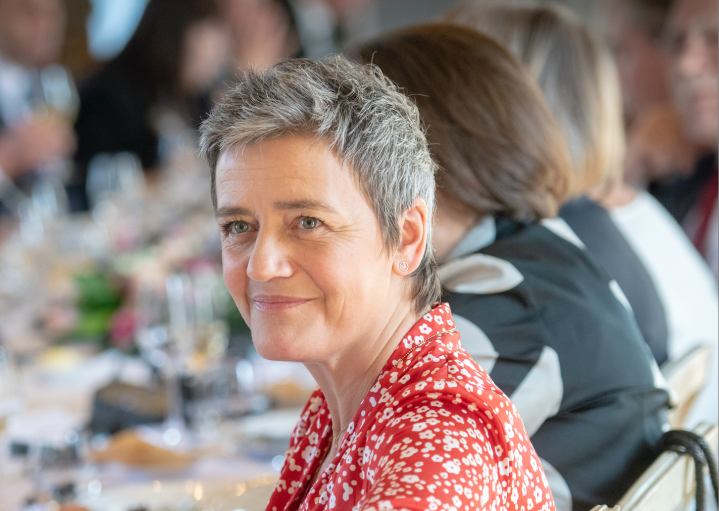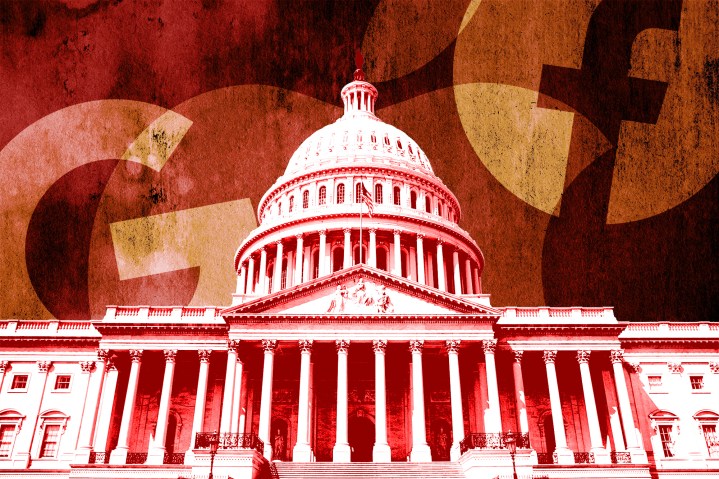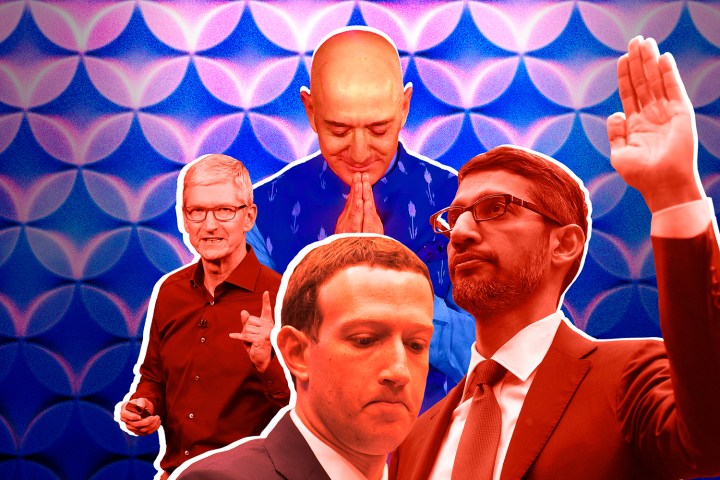
There aren’t too many people that strike fear into the hearts of what the writer McKenzie Wark calls the “vectoralist class.” These are the C-suite executives with Scrooge McDuck-sized piles of money and more influence than a dozen Dale Carnegies, who run the likes of Apple, Google, and Facebook. But Danish politician Margrethe Vestager is almost certainly one of them.
As the European Commissioner for Competition since 2014, and Executive Vice President of the European Commission for A Europe Fit for the Digital Age since 2019, Vestager — a professional politician since the age of 21 — has made no bones about going after the Silicon Valley whales. Within months of taking over the role of antitrust boss more than half a decade ago, she brought charges against Google. In 2016, her office hit Apple with a $16 billion tax bill — the largest such fine in history — for alleged illegal state aid in Ireland (the case is currently in the appeals process). And she’s just getting started.
Vestager spoke with Digital Trends about fairness in the tech world, why technology companies tip over into monopolies more often, and what scares her about technology in 2020.
Digital Trends: When it comes to tech companies, antitrust, and the question of fairness, what are the main things that you look for in order to establish an even playing field?
Margrethe Vestager: [Technology markets] seem much more likely to tip because of the characteristics of the market: network effects, zero pricing issues, marginal costs approaching zero — just to mention three things that we find a lot. We see a number of markets that have tipped already: Google is absolutely dominant in search. If you’re in that position, how do we make sure that businesses in neighboring markets have a fair go at it? What do we expect from the gatekeepers of this world? That is one consideration.
The second one is to prevent markets from tipping when they have these inherent characteristics that make this more likely. The benefit of a market that has not tipped is that you do not have a gatekeeper, that many more businesses can be there, you have more competition, and it’s easier to deal with interoperability issues.
DT: Do you think tech companies have enjoyed a lack of scrutiny around the world in terms of antitrust? These are the cool, Californian companies that bring us the next great gadget or help us speak to our friends on social media or look up information, seemingly for free. Has this perception affected how they are scrutinized?
MV: No, I don’t think that it’s because of that. I think it’s because of the novelty. As far as I know economic history, whenever you have a breakthrough of a new technology, there has been a phase where the legislators and the societal understanding are on the back-burner trying to figure out what this thing is and what role it will play in society. Eventually, society and our democracies catch up and establish a legislative framework for the technology to say, ‘Yes, of course we want the disruptive characteristics to unfold, but we still have the right to make the choices as to what will be accepted in our society when these forces are unfolding.’

You can see that in the first Industrial Revolution. In the beginning, there were horrible working conditions, child labor, environmental issues. Then, eventually, democracy catches up and says, ‘No, we don’t want our children to work in factories, we want them to go to school. No, you’re not going to pollute our waters, because eventually we’re going to drink it, and we like the idea that we share this planet with other species. I think it’s the same motion that we’re going through. [But this time, there] is a scope and a speed that is so much bigger and faster than in previous revolutions.
DT: One company the European Commission has scrutinized heavily is Apple. Apple’s an interesting company when it comes to competition. Recently, it became the first U.S. tech giant to surpass the $2 trillion market cap. It’s clearly got a whole lot of power.
But it’s also not the leader in any one area it operates in. There’s the Google Play app store which is a strong competitor to the iOS App Store. Worldwide, Android market share is bigger than iOS. Spotify has more subscribers and users than Apple Music. Netflix and Disney+ are far bigger than Apple TV+. You can carry on down the list. What is it about Apple that potentially qualifies it for antitrust scrutiny?
MV: We have a couple of Apple investigations ongoing: Two on the App Store, one on Apple Pay. What we see [with Apple] is extreme lock-in effects. [For example, if you have], 25,000 photographs [on iCloud], do you buy a new phone from another provider with another operating system, where it’s completely opaque to you if you’ll be able to take these treasured photographs of your children since they were very small somewhere else?
Even though the market shares are not as big as, for instance, the Google market share in search, you have [areas where Apple can behave as though it owns a market.] These are features that we can establish. [If you’re in an ecosystem] universe, and your family members are in the same universe, it allows you to do seamless exchanges, that kind of convenience. [But] that also allows a market to establish itself with extreme barriers to entry, and with extreme barriers to getting out of it again.
DT: How do you balance the need to be fair to competing businesses with the fact that, frankly, ecosystems can be beneficial to users? My parents aren’t particularly technical, for example. For them, the fact that their iPhone will easily speak to their iPad or their HomePod makes it easy for them to use. They can go into a store and pay with Apple Pay. Is there an argument to be made that these kinds of lock-in effects, far from negative, can actually be beneficial for users?
MV: Yes, as long as they remain open. Even though the market shares may not be enormous, when you own your own market it becomes important that others have entry as well. Some of the complaints that we have about the Apple App Store are exactly that: others do not have the same privileged access as Apple’s own products. That could be [Apple Music versus rival streaming music services, Apple Pay versus other pay services].
Then there is also the interoperability [question, whereby] other service providers are capable of offering their services to consumers who own and use Apple devices so that there’s still competition in some of these services, and that service providers have a fair chance of getting to consumers. There should be a choice between, as you say, Apple products that fit together and maybe other products that you would want to use on your gadgets.
I completely understand the convenience part of it, but you also want to have competition to give [rise to] pressure for innovation in these areas. There is no pressure for innovation on other service providers if they’re not capable of reaching customers who are in the Apple universe.

DT: Do you think it will ever be possible to get any kind of international agreement on this area? Will these questions about competition law always be piecemeal throughout the world or is it possible to come up with unified laws for dealing with the tech giants?
MV: Things have changed a lot in the last five years. There is renewed [scrutiny] in the U.S., [investigations within the] Australian Competition authority, and, within our international competition network, increased debate about these issues. Also, I think people have realized that it’s not sustainable as we start the next chapters of digitization to have unregulated Big Tech. As the entire economy digitizes, you need a much more democratic or competitive marketplace in order to make the best of the technology. We have not written the last chapter on digitization. On the contrary, I think we’re just in the process of finalizing the first chapters.
DT: Boris Johnson, the British prime minister, rather unflatteringly referred to you as a “crop- haired … left-wing” character in an op-ed a few years back. Is there something inherently left-wing and ideological about what you are doing by targeting tech giants?
MV: Well, it depends on how you see the European treaties. They are, of course, man-made — I think, in this case, literally man-made. The founding fathers saw how the market had played a negative role in the run-up to the Second World War. They saw the negative [impact] of monopolies and concentration, and how customers were not well-served by it. They made choices back then, and choices are inherently political. These are the choices that we enforce today.
I think we now have evidence on our side to show that they create effective marketplaces that generate prosperity; that makes sure that every customer, no matter where they are in our society, have a say. That they are served by the market with affordable prices, choice, quality, and innovation. That is the very fundamental point: That the market should serve the customer and not the other way around. One can label that in any way one wants, but this is a union based on the rule of law, with equal treatment and proportionality. These obligations are testable in front of our court system. I’m very, very proud to be allowed to do this kind of work.
DT: What scares you most about technology in 2020?
MV: I love magic. I really like it. The perfect Friday night for me would be a magic show. This is because I enjoy being tricked, but knowing that I’m being tricked. A magic show is literally labeled, ‘I’m going to trick you.’ Sometimes I have this feeling that technology plays the same role, just without the labeling. It works in ways that are very difficult to see through. It makes you do things that, if you thought about it, you would say, ‘Why is that important? Why is it important for me to keep doing this every day? Just to have this small icon popping up to say you’re successful, you have been doing this for seven days in a row.’
DT: What do you hope you will be able to achieve during your second term?
MV: The most fundamental thing is to contribute to building trust in a society that makes best use of digital technologies. That we do not get estranged from our societies as they become so much more tech and data-driven. Instead, we trust as humans that we are in control. That, for me, is the only way that we make full use of all the promises in digital technologies.
Those promises are enormous. For instance, I visited a Danish hospital that is supposedly the best in Denmark at cancer diagnostics. [They use A.I. to carry out fast diagnosis.] But if [we can’t trust these tools], you will never use them. Then we cannot keep our promises about a world-class health system for every citizen, not just those who can pay their own way. We cannot keep our promises of a world-class educational system, where no matter where you are in your society, if you have the talent and the drive, you can get the best possible education. That is the driving force. Below that are very specific targets about [areas like] connectivity. But the main thing to do is to build trust.
This interview has been edited for length and clarity.


